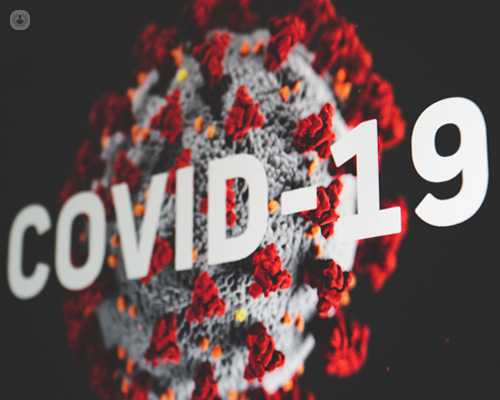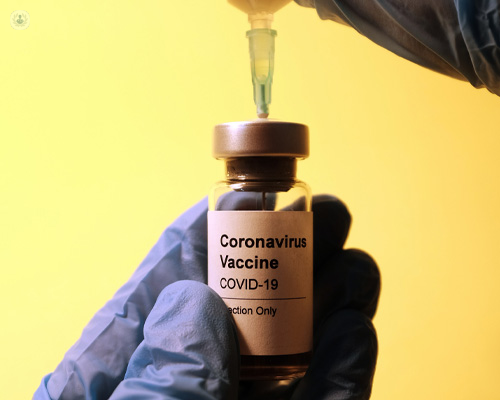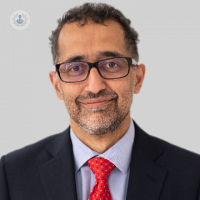An expert explains COVID-19 and LONG COVID
Autore:Over a year has passed since COVID-19 entered our lives. However, there are still many questions surrounding what it is and its impacts. Dr Iqbal Malik, an award winning consultant cardiologist, answers the main questions and explains the connection with the heart and lungs.

What Is COVID-19 disease?
Covid-19 disease is caused by SARS-CoV-2 virus. Coronaviruses have also caused the common cold, but this is far from a “common cold” and it is also far from “just influenza”. This seems to be a more multi-system disease, which isn’t really an inflammation of the blood vessels.
Some believe it to be a lung disease because the lungs are the first in line as the virus gets to you. But once it’s inside you, it affects a lot of blood vessels causing them to be inflamed and then perhaps clot. This sets off heart attacks, strokes, and other problems. But of course, because the lungs are so important to delivering oxygen around the body, if they start being destroyed by the virus then you can’t breathe. Hence the common symptoms of coughing, breathlessness, and, actually strangely, a lack of sense of smell. This last feature is not present in all COVID cases.
What should you do if you have COVID-19?
To give your body the best chance, you should keep hydrated, keep up the food intake, exercise regularly, and practise lung exercises. These include deep breathing exercises like blowing up a balloon and also lying on your front and practising breathing. This helps to recruit the back parts of your lungs that are perhaps not used all the time. You may need those if you develop serious COVID-19 disease.
If you have a fever along with the above symptoms, then you need to be concerned that it’s not just a cold and it might be coronavirus disease, especially in this pandemic. If this is the case, you should seek out a test to reassure yourself that you do or do not have it. If you do, you must self-isolate. If you can’t get a hold of a test, then you should self-isolate in any case to protect others from you. If you think you have COVID-19, you have to look after yourself and those around you, especially the older generation. Even if they have been double vaccinated, they might still get the disease.
If you do have it, a drop in oxygen saturation of 3 or 4 per cent from your baseline is something to pay attention to. Many people now have home pulse oximeters that can tell what oxygen level you’re at. Someone who is young and fit would normally have about 99 per cent. But if you are older and you’ve had COPD or asthma or other lung problems, you may not start off at 99 percent, and starting at 94 or 95 per cent is not something to worry about. It’s the change from your baseline that is important.
If you’re getting breathless going up the stairs, then you can live with that. If you’re getting breathless standing up, then you may be in trouble and you should seek some medical attention. Of course, you do not want to walk into your general practitioner surgery, straight into an A&E department, or the wrong place without thinking about it. This may result in closing off a whole section of that unit if they feel there is now a contamination; it may take the staff offline; it may take other patients offline (permanently!). Think carefully, but please protect yourself, ring 111, get some advice, and make sure you’ve told someone else in your family that you’re feeling unwell so they can be there to support you. If you’re really sick, call 999.
What is LONG COVID?
We’re increasingly recognising, as with many infections we’ve known about before, that the acute phase disappears, but some people are left completely washed out. Although there’s a group that says this might be psychological, this actually is just not true. There are some people whose physiology is really devastated by the infection and then LONG COVID disease.
It’s probably not one disease.
There’s a branch of it, which is mainly centred on the heart where your control of heart rate and blood pressure is affected. For example, you may want to go run down the street, but it’s just not possible due to the change in blood pressure. There’s long COVID that would be resting on the lungs where the oxygen transfer is not happening properly and perhaps it is that the lungs are scarred. There is another long COVID that is more neurological, where the way your brain drives your nerves, so then driving your muscles is affected.
As we find out more about people surviving after COVID, there genuinely is going to be a group of people that will be long-suffering and it may take them a year or more to recover. However, with the right support, both psychological and physical—because it is depressing to be sick, of course, and to get over the physical symptoms—I would hope for a good recovery, as it happens with a lot of other conditions.
So, is this a version of myalgic encephalomyelitis (ME), also known as chronic fatigue syndrome? Possibly, but we haven’t found real physical reasons for ME that are easy to discover, but we know some people are very fatigued. The cause being not clear, and these are not people who’ve always been “lazy”. They’ve often been very high achievers that have suddenly been knocked out by the illness. So, LONG COVID is a real disease and it’s probably not one disease but several, actually. Each facet would require slightly different treatment.
The bizarre thing is that the initial COVID episode may have been mild. But the LONG COVID turns out to be much more severe.
Are COVID-19 and LONG COVID real?
Is this really a question? I find it amazing in my experience, that I live in London and catch a number of cabs around the city, where some of my drivers have asked the question. The internet is full of those who do not believe the science! I am not certain how it came about (escaped from a lab/jumped from bats/ etc.). But, as a doctor, do I believe COVID-19 disease exists. I point out that our intensive care units were full of people who have been very seriously affected for no reason apart from having the SARS-CoV-2 virus. It’s slightly shocking to understand that some people still don’t believe it exists.

What about vaccines?
Short answer: get vaccinated. The disease will kill you if you are in a high risk group, and might kill you even if you are fit and healthy. OK, you don’t care if you die? Well, then think of others – you may spread if to others even if you don’t get unwell. And it will be you responsible for the transmission. It is a VERY transmissible disease. It is NOT the flu. It can kill you. We were lucky in the UK to have just about copied in 2020 with the pandemic. As of August 2021, we have no got rid of it. As of August 2021, the whole population has still not even had the first jab. As of August 2021, the rest of the world is way behind the UK, and first world countries in vaccination rates. This matters as the virus spreads fast, it mutates. If it mutates enough, we will get a virus that may escape our vaccines. Then we will be back in trouble.


